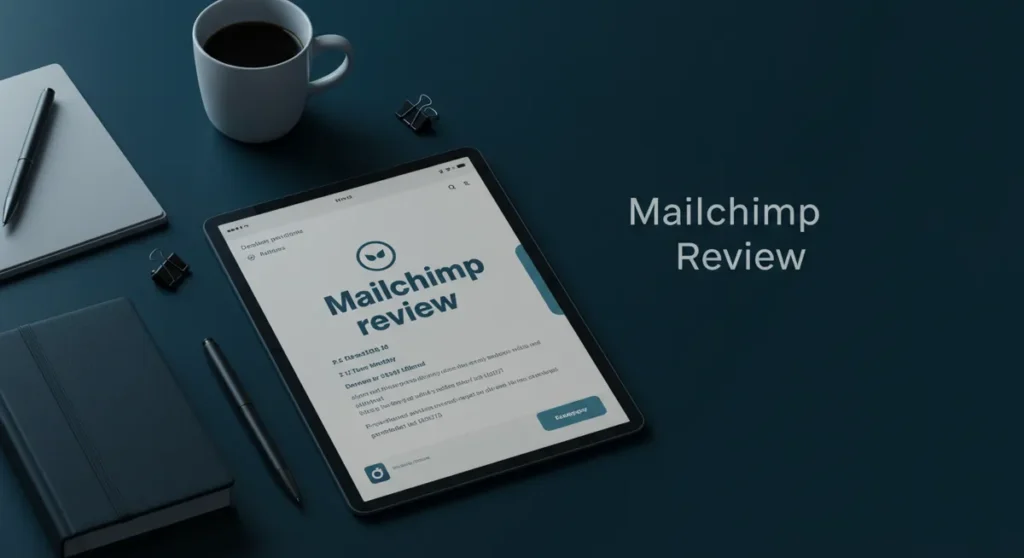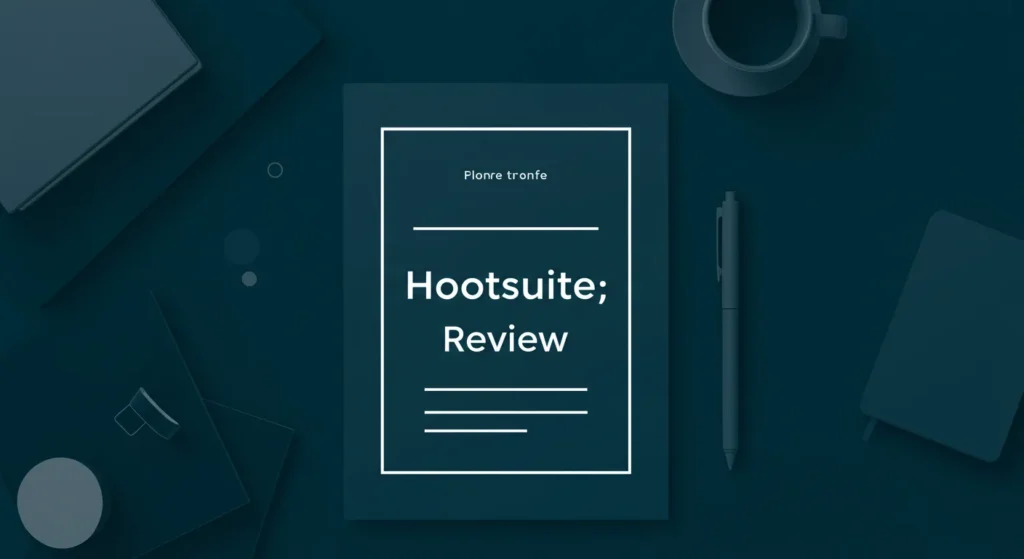Growing a business is chaotic. Leads fall through the cracks. Emails get buried. Sales pipelines? Messy at best. When you’re scaling, every missed opportunity stings.
Enter HubSpot CRM—a tool designed to simplify the chaos. It gives you an all-in-one solution to manage your contacts, sales, and marketing efforts. And the best part? It doesn’t require a degree in rocket science to use. Whether you’re a startup or an expanding team, HubSpot CRM helps you stay organized and close deals faster.
HubSpot stands out for its simplicity and scalability. It offers a free plan that actually delivers value, not just as a bait-and-switch. You get tools to organize your data, automate workflows, and track every interaction—without drowning in complexity. For growing teams, that’s a game-changer.
In this review, we’ll break down why HubSpot CRM could be the tool you’ve been waiting for. From key features to real-world use cases, we’ll help you decide if it’s the right fit for your team.
Let’s dive in.
- What is HubSpot CRM?
- Key Features and Functionalities
- A. Contact & Lead Management: Building Relationships from the Ground Up
- B. Sales Pipeline Management: From Prospect to Paying Customer
- C. Marketing Automation: Nurturing Leads and Driving Conversions
- D. Customer Service Tools: Building Loyalty Through Exceptional Support
- E. Reporting and Analytics: Data-Driven Insights for Growth
- HubSpot CRM Pricing and Plans
- Pros and Cons of HubSpot CRM
- Who is HubSpot CRM Best For?
- HubSpot CRM Alternatives
- Conclusion
What is HubSpot CRM?
At its core, HubSpot CRM is one of the best CRM tools that help businesses of all sizes organize contacts, track interactions, manage deals, and automate tedious tasks. But it’s more than just a traditional CRM. It’s the foundation of the HubSpot ecosystem, seamlessly integrating with other “Hubs” like Marketing, Sales, Service, CMS, and Operations to create a unified customer experience platform.
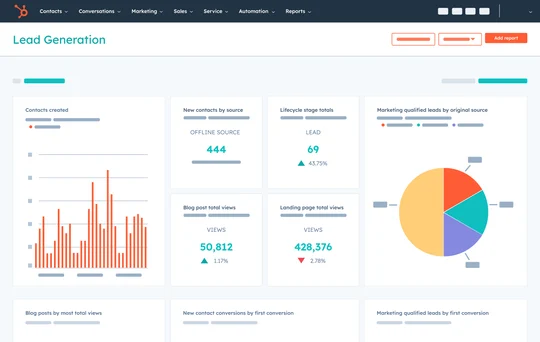
HubSpot dashboard (Source: hubspot.com)
Imagine having all your customer data in one place, accessible to everyone on your team. No more silos, no more missed opportunities. HubSpot CRM makes this a reality. It provides a comprehensive view of each customer’s journey, from their first interaction with your website to their latest purchase and beyond.
The platform is designed to be intuitive and user-friendly, even for those new to CRMs. It offers a free version to get started, with paid tiers (Starter, Professional, Enterprise) unlocking more advanced features as your needs evolve. We’ll dive into the pricing details later. The key takeaway? HubSpot CRM aims to simplify your operations and empower your team to build stronger customer relationships.
Key Features and Functionalities
Let’s explore the features that make HubSpot CRM a powerful ally for growing teams:
A. Contact & Lead Management: Building Relationships from the Ground Up
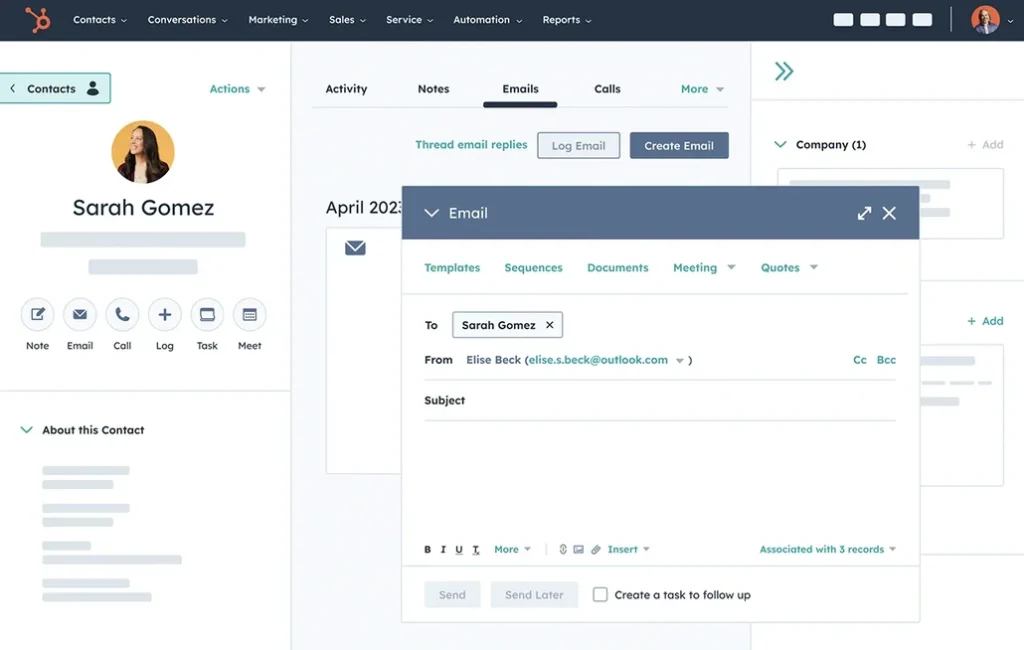
HubSpot contact profile (Source: hubspot.com)
HubSpot CRM excels at keeping your contacts organized and your leads nurtured.
- Detailed Contact Profiles: Every contact record is a treasure trove of information. You’ll find not only basic details like name and email but also a complete history of interactions, including website visits, email opens, form submissions, and notes from your team. This 360-degree view empowers you to personalize your communication and build stronger relationships.
- Segmentation and Lists: Slice and dice your contact database into targeted lists based on demographics, behavior, deal stage, or any other criteria you define. This segmentation is crucial for delivering personalized marketing campaigns and tailoring your sales approach.
- Lead Capture and Management: HubSpot provides a suite of tools to capture and nurture leads effectively.
- Forms and Pop-ups: Easily create and embed forms on your website to capture valuable lead information.
- Live Chat and Chatbots: Engage with website visitors in real-time, answer their questions, and qualify leads automatically.
- Lead Scoring: Assign points to leads based on their engagement and demographics, helping you prioritize your outreach efforts.
- Email Tracking and Notifications: Know exactly when a prospect opens your email or clicks a link. These real-time notifications provide valuable insights into lead engagement, allowing you to follow up at the perfect moment.
B. Sales Pipeline Management: From Prospect to Paying Customer
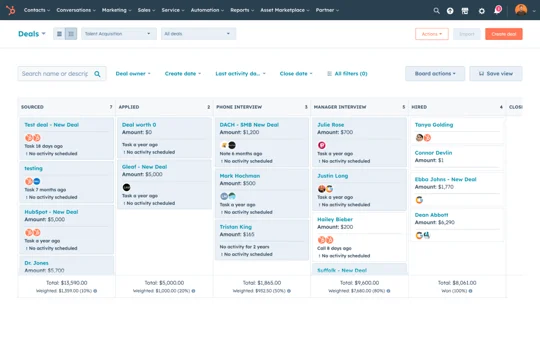
HubSpot deal pipeline (Source: hubspot.com)
HubSpot CRM provides the tools to manage your sales pipeline with clarity and efficiency.
- Deal Stages and Customization: Visualize your sales process with customizable deal stages that mirror your unique workflow. Whether you use a simple “Prospect – Qualified – Demo – Proposal – Closed Won/Lost” pipeline or something more complex, HubSpot adapts to your needs.
- Deal Tracking and Forecasting: Track the progress of each deal, assign values, set close dates, and get a clear overview of your pipeline. HubSpot’s forecasting tools use this data to predict future revenue, helping you make informed business decisions.
- Task Management and Automation: Streamline your sales activities by creating tasks, setting reminders, and automating follow-ups. This ensures that no lead slips through the cracks and frees up your sales team to focus on building relationships.
- Meeting Scheduler: Eliminate the back-and-forth of scheduling meetings. HubSpot’s meeting scheduler integrates with your calendar, allowing prospects to book appointments directly with you.
C. Marketing Automation: Nurturing Leads and Driving Conversions
While technically part of HubSpot’s Marketing Hub, the automation features seamlessly integrate with the CRM, creating a powerful synergy.
- Email Marketing: Design beautiful, responsive emails using pre-built templates or create your own from scratch. Automate email sequences to nurture leads, onboard new customers, or promote special offers. Track open rates, click-through rates, and other key metrics to optimize your campaigns.
- Landing Page Creation: Build high-converting landing pages without needing a developer. These dedicated pages are designed to capture leads and drive specific actions, such as signing up for a webinar or downloading an ebook.
- Social Media Management: Schedule posts, monitor mentions, and analyze engagement across multiple social media platforms, all from within HubSpot. This centralized approach saves time and ensures a consistent brand voice.
D. Customer Service Tools: Building Loyalty Through Exceptional Support
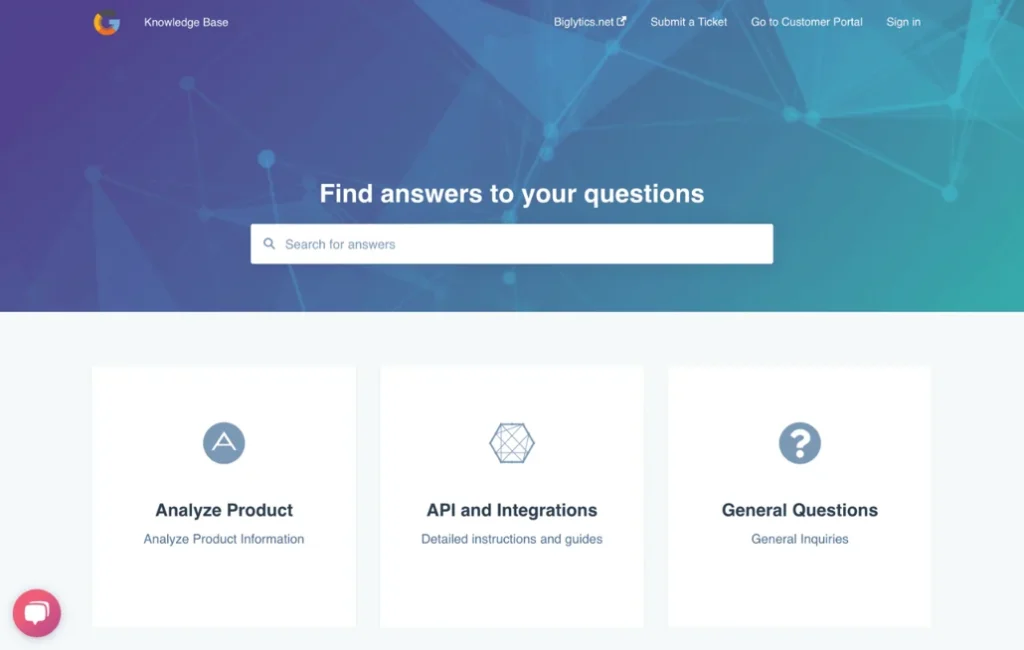
HubSpot knowledge base (Source: hubspot.com)
HubSpot’s Service Hub integrates with the CRM to empower you to deliver exceptional customer service.
- Ticketing System: Manage customer support requests efficiently with a centralized ticketing system. Assign tickets to team members, track their progress, and ensure timely resolution.
- Knowledge Base Creation: Empower your customers to find answers to their questions with a self-service knowledge base. This reduces support tickets and improves customer satisfaction.
- Customer Feedback Surveys: Collect valuable feedback from your customers through surveys. Use this feedback to identify areas for improvement and enhance your products or services.
E. Reporting and Analytics: Data-Driven Insights for Growth
HubSpot provides robust reporting and analytics to track your performance and make data-driven decisions.
- Customizable Dashboards: Create personalized dashboards to visualize your key performance indicators (KPIs) at a glance. Monitor sales performance, marketing campaign effectiveness, customer service metrics, and more.
- Sales and Marketing Reports: Dive deep into your data with pre-built and custom reports. Analyze sales trends, identify top-performing team members, track marketing ROI, and gain a deeper understanding of your customer base.
- Attribution Reporting: Understand which marketing channels are driving the most revenue. This helps you optimize your marketing spend and allocate resources effectively.
HubSpot CRM Pricing and Plans
This tool offers a tiered pricing structure, starting with a surprisingly robust free plan. This makes it accessible to businesses of all sizes, even those just starting out.
- Free Plan: Includes contact management, deal tracking, task management, email scheduling, live chat, and more. It’s a fantastic starting point for very small businesses or those new to CRMs. However it does come with some limitations, such as only being able to connect one email inbox.
- Starter (Starting at $18/month): Removes HubSpot branding from forms, landing pages, live chat, and email marketing features. It also allows for the ability to connect more email inboxes, make calls from the CRM, and set up paid ad campaigns.
- Professional (Starting at $1,600/month): This is where the platform’s true power unlocks. You get advanced automation features, including workflows, lead scoring, and ABM tools. You also unlock Sales Analytics, Calculated Properties, and forecasting. This tier is ideal for growing teams with more complex sales and marketing processes.
- Enterprise (Starting at $5,000/month): Designed for large organizations with sophisticated needs. It offers advanced features like custom objects, predictive lead scoring, single sign-on (SSO), and hierarchical teams.
Hub Bundles: HubSpot offers bundles that combine multiple Hubs (e.g., Marketing + Sales) at a discounted price. This can be a cost-effective option for businesses looking for an all-in-one solution.
Value for Money: HubSpot’s pricing can seem steep, especially at the Professional and Enterprise levels. However, the platform’s comprehensive features, ease of use, and potential ROI can justify the cost for many businesses. The free plan is a risk-free way to test the waters, and the paid plans offer a clear path to scale as your needs grow. When considering that each tier also increases the number of marketing contacts allowed, with enterprise allowing for 10,000 contacts, this further increases the value of the higher tier plans.
Pros and Cons of HubSpot CRM
No CRM is perfect, and HubSpot is no exception. Here’s a balanced look at its strengths and weaknesses:
Pros:
- User-Friendly Interface: HubSpot is renowned for its intuitive design and ease of use. Even non-technical users can quickly get up to speed.
- All-in-One Platform: When combined with other Hubs, HubSpot offers a comprehensive solution for marketing, sales, and service.
- Powerful Automation: HubSpot’s automation capabilities can save your team countless hours and improve efficiency across the board.
- Strong Reporting and Analytics: Gain valuable insights into your performance and make data-driven decisions.
- Extensive Integrations: Connect HubSpot to hundreds of other apps, extending its functionality and streamlining your workflow.
- Excellent Customer Support and Resources: HubSpot offers top-notch customer support and a wealth of educational resources through HubSpot Academy.
- Scalability: HubSpot can grow with your business, from the free plan to the Enterprise level.
Cons:
- Cost: The paid plans can be expensive, especially for small businesses with limited budgets.
- Advanced Features Locked Behind Higher Tiers: Some powerful features, like predictive lead scoring and custom objects, are only available in the Enterprise plan.
- Dependence on the HubSpot Ecosystem: While integrations are plentiful, you’re still somewhat tied to the HubSpot ecosystem.
Who is HubSpot CRM Best For?
HubSpot CRM is a versatile platform that can benefit a wide range of businesses, but it’s particularly well-suited for:
- Small to Medium-Sized Businesses (SMBs): HubSpot’s scalability and affordability make it an excellent choice for growing businesses looking to streamline operations and improve customer relationships.
- Startups: HubSpot can help startups build a solid foundation for managing customer interactions and driving early growth. The free plan is especially attractive for startups with limited budgets.
- Sales and Marketing Teams: HubSpot’s integrated platform fosters collaboration between sales and marketing, providing a unified view of the customer journey and enabling more effective campaigns.
- Companies Seeking Automation: If you’re looking to automate repetitive tasks, improve efficiency, and free up your team’s time, HubSpot’s automation features are a game-changer.
- Businesses Looking for an All-in-One Solution: HubSpot’s comprehensive suite of tools, encompassing marketing, sales, and service, eliminates the need for multiple disparate systems.
HubSpot CRM Alternatives
While HubSpot is a strong contender, it’s essential to consider other options. Here’s a brief comparison with some of its top competitors:
- Salesforce: The industry behemoth, Salesforce offers unparalleled customization and scalability. It’s best suited for large enterprises with complex needs and deep pockets. Salesforce can be more challenging to use and implement than HubSpot.
- Zoho CRM: A more affordable alternative, Zoho CRM offers a wide range of features and a user-friendly interface. It’s a good option for small to medium-sized businesses looking for a balance of functionality and affordability. Zoho CRM might not be as polished or comprehensive as HubSpot in certain areas.
- Pipedrive: Known for its visual pipeline management, Pipedrive is a sales-focused CRM that’s easy to use and implement. It’s a great choice for sales teams that prioritize simplicity and a clear view of their pipeline. Pipedrive lacks some of the marketing and service features found in HubSpot.
- ActiveCampaign: Primarily an email marketing automation platform, ActiveCampaign also offers CRM functionality. It’s a strong contender for businesses that prioritize email marketing and automation. It is often seen as having a better marketing hub than HubSpot, while having a less robust CRM offering.
When to Consider Alternatives:
- If you need highly customized workflows and have a large budget, Salesforce might be a better fit.
- If you’re on a tight budget and need a wide range of features, Zoho CRM is worth exploring.
- If you need a simple, sales-focused CRM with a strong emphasis on pipeline management, Pipedrive could be the answer.
- If email marketing automation is your primary need, ActiveCampaign may be more suitable.
Conclusion
HubSpot CRM is a powerful, user-friendly, and comprehensive platform that can significantly benefit growing teams. Its seamless integration with other HubSpot Hubs, robust automation capabilities, and strong reporting and analytics make it a compelling choice for businesses looking to streamline operations, nurture customer relationships, and drive growth.
While the cost of higher-tier plans might be a barrier for some, the free plan offers a risk-free way to experience the platform’s core features. Ultimately, the decision of whether or not to invest in HubSpot CRM depends on your specific needs, budget, and business goals.
Ready to take the next step? Sign up for a free trial of HubSpot CRM, explore their website for more in-depth information, or contact their sales team for a personalized demo. You might just discover the all-in-one CRM solution your growing team has been searching for.

